Thursday, September 28, 2006
Suggested Reading: 9/11 and Terrorism
Tuesday, September 26, 2006
Banned Books Week
The ACLU of Texas Banned Book Project releases an annual report, "Free People Speak Freely," during Banned Books Week. You can pick up a copy of this year's report at the Faulk Central Library until supplies run out. The ACLU of Texas Banned Books Project exists to raise awareness about the level of book challenges and bans in Texas public school libraries, to encourage school officials to use professional librarian standards when confronted with a challenge, and to encourage other ACLU affiliates, library associations, and similar freedom of expression interest groups to conduct similar surveys in their own states.
See ALA's list of the most challenged books in 2005
Thursday, September 21, 2006
Book Clubs
Thursday, September 14, 2006
Book Towns: Paradise for Book Lovers
Next time you are planning a trip, you might consider visiting a book town. The first book-town was founded in 1961 by Richard Booth in the little English village called Hay-o-Wye. Booth transformed abandon houses to bookstores of rare, out-of-print and secondhand books. Against all odds, Booth transformed Hay-o-Wye into the most famous book town and inspired other cities around the world to start their own book town too.
Little towns and villages with panoramic views and historic value are the ones that usually evolve into book towns. To give an idea about the density of bookstores in a book town, visitors might find about 30 bookstores in a town of 2000 habitants. Book-Towns are like a paradise for book hunters: first editions, rare books, and literature festivals are some of the things one can find when visiting these small charming cities.
For more information on book towns here are some links:
Traveling Librarian: Seattle Public Library
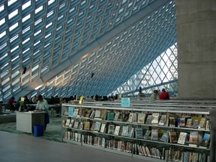
This building made me smile when I saw it and when I meandered around inside. It's huge, it's beautiful, it's forward-thinking, and it is a place worth visiting. - your traveling librarian
Tuesday, September 05, 2006
Libraries and Websites for Teens
Now there is legislation in congress that would effectively require most schools and libraries to render these sites inaccessible to minors. The American Library Association has maintained 5 key points regarding the legislation which can be read on the group's Washington Office web page: http://www.ala.org/ala/washoff/WOissues/techinttele/dopa/DOPA.htm
Friday, September 01, 2006
Traveling Librarian: La Paz Public Library
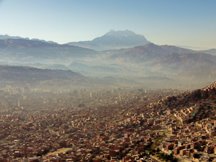 The Traveling Librarian recently visited La Paz, Bolivia, which is one of the two capital cities of this South American country.
The Traveling Librarian recently visited La Paz, Bolivia, which is one of the two capital cities of this South American country.La Paz is the highest capital city in the world with an approximate altitude of 10,000 to 14,000 feet depending where you are located within the city. It is so high because it is located in the cordillera of the Andes Mountains.
The mountain in the background above is Mt. Illimani. At over 21,000 ft. it is higher than any peak in North America. The haze in the photo is actually smoke from fires that were burning in the Amazon basin to the north.
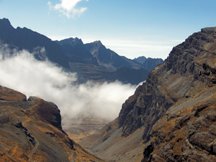
This is a gratuitous shot of the cordillera just east of the city.
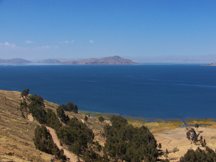
This is a gratuitous shot of the gorgeous Lake Titicaca. It is the highest navigable lake in the world. Despite it's funny name, it is revered by locals.
Of course, the Traveling Librarian also visited the La Paz Public Library (Biblioteca Municipal). In a system with little economic means, this library manages to do quite well, which is a credit to their staff.
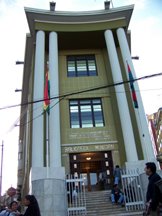
This semi-crooked photo shows the newly refurbished facade of La Paz Public Library.
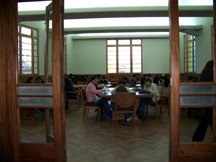 Because the library has limited funds it does not allow people to actually leave the building with the books. In fact, they usually have to provide some type of collateral, such as an ID, to get their hands on the books, which are in closed stacks that are not directly accessible by the public. Nonetheless, the attractive reading rooms were all full.
Because the library has limited funds it does not allow people to actually leave the building with the books. In fact, they usually have to provide some type of collateral, such as an ID, to get their hands on the books, which are in closed stacks that are not directly accessible by the public. Nonetheless, the attractive reading rooms were all full.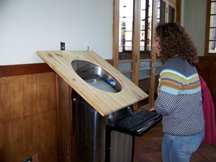
They have limited electronic resources and they guard them zealously.
Visiting the library in La Paz library made me feel lucky for what is available to us here in the States. However, I was very impressed by their ability to make do with limited resources.
The Traveling Librarian is currently visiting the Pacific NW and will have more to report soon!



